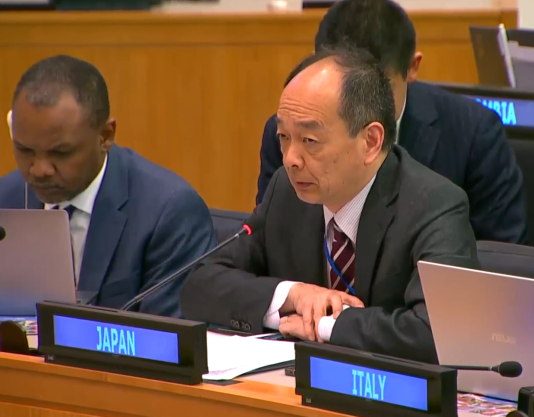平和構築基金(PBF)の取組に関する平和構築委員会(PBC)大使級会合における山中大使ステートメント
令和6年4月25日

(As delivered)
Thank you, Mr. Chair, for convening today’s important meeting and I would like to appreciate the briefing by Ms. Spehar, and the informative remarks by the Minister of Liberia Ms. Nyanti and Ambassador of South Sudan, Mrs. Adeng.
At the Security Council Open Debate on “Promoting Conflict Prevention” held last month under Japan’s presidency, the importance of enhancing coordination between the PBC and the Peacebuilding Fund (PBF) was suggested by many countries. I welcome today’s meeting as an exact example of this idea.
The PBC can enhance the transparency and visibility of the PBF by more actively discussing PBF projects, in particular their good practices and the challenges to addressing root causes of conflicts.
In this way, the PBC can be a platform to further mobilize the PBF as a source of seed money to catalyze related investments by IFIs and others. The PBC can also be a good platform to deepen the understanding of the work of IFIs and seek the best way to collaborate for a greater impact on subject countries and their peoples.
In this regard, I would like to ask if there are any ideas on how to better involve IFIs in peacebuilding activities?
During the Security Council Open Debate I earlier mentioned, the importance of prevention was also affirmed, as it means avoiding the human tragedies and devastating impacts of conflicts. Many countries recommended utilizing the PBC to catalyze support for coordinating and implementing nationally-led prevention efforts by inviting relevant UN agencies, regional organizations, IFIs, as well as local stakeholders, including women and youth.
It’s great to see the PBF also focus more on conflict and violence prevention, including early warning. The PBF can showcase related successful projects in prevention, as appropriate.
The PBF has a unique character that allows for comprehensive approaches involving UN and non-UN entities, including peace operations, AFPs, and IFIs. It is well positioned to catch the signs of conflicts, which can be reported to the PBC for discussion as early warning, and the Security Council will be able to utilize such information by requesting the PBC’s advice.
Also for Member States, there should be a clear incentive to utilize both the PBC and the PBF.
To give such an incentive, it could be an idea that when a country calls for a PBC meeting to present its priorities, strategies, challenges and necessary support, ahead of its application to the PBF, its application may be considered favorably during the PBF project selection process. If its applications are not selected, the PBSO can explain the reasons for non-selection to maintain the transparency and accountability of the PBF.
Such a system will encourage national ownership, embody national political-will and initiative, and provide concrete follow-up to PBC meetings.
Related to this I would like to ask, what are the challenges of the PBSO in coordinating between the PBF and the PBC, if any?
To conclude my words, I would like to stress Japan recently further contributed 3.7 million US dollars, to both the PBF as well as the Partnership Facility with International Financial Institutions.
We are looking forward to further cooperation to advance prevention and peacebuilding for sustainable peace.
I thank you.
